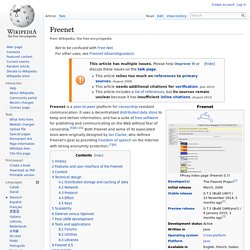

Top 10 best emulators for Android. Thanks to inexpensive or even free emulators flooding the Android Market, it’s perfectly possible to play almost every game system released right up to Sony’s revolutionary PlayStation whenever or wherever you want. The only real problem is the lack of physical controls on Android phones, and while virtual control pads work relatively well a Bluetooth control pad – like the Game Gripper – is pretty essential for accurate play. Most emulators support them, while some impressively allow you to use a Wiimote as a controller (the D-pad and buttons, obviously), but check the write-ups on the Android Market to be sure. If emulation is a more serious pastime for you, Sony’s hit Xperia Play mobile is the primo choice for the retro hardcore thanks to its classy slide-out control pad. To learn how to download emulators onto an Xperia Play (or any Android phone) read our handy guide. psx4droid SNesoid Astonishingly, net play is also possible via wi-fi or local Bluetooth.
Gensoid NESoid GBAoid Marvin. Java (programming language) Duke, the Java mascot Sun Microsystems released the first public implementation as Java 1.0 in 1995.[1] It promised "Write Once, Run Anywhere" (WORA), providing no-cost run-times on popular platforms.
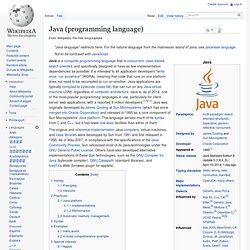
Fairly secure and featuring configurable security, it allowed network- and file-access restrictions. Major web browsers soon incorporated the ability to run Java applets within web pages, and Java quickly became popular. With the advent of Java 2 (released initially as J2SE 1.2 in December 1998 – 1999), new versions had multiple configurations built for different types of platforms.
For example, J2EE targeted enterprise applications and the greatly stripped-down version J2ME for mobile applications (Mobile Java). On November 13, 2006, Sun released much of Java as free and open source software, (FOSS), under the terms of the GNU General Public License (GPL). There were five primary goals in the creation of the Java language:[23] Major release versions of Java, along with their release dates: Internet Experts - Top Social Bookmarking Website for SEO, Social Media Optimization and Digital Marketing. List of document markup languages. The following is a list of document markup languages.
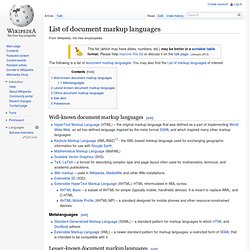
You may also find the List of markup languages of interest. Web intelligence. Military Plans Multi-Exabyte Storage Cloud. Webopedia: Online Computer Dictionary for Computer and Internet Terms and Definitions. The TCP/IP Guide: Introduction and "Guide To The Guide" The TCP/IP Guide: Introduction and "Guide To The Guide" Chances are pretty good that even before you started reading this Guide, you had heard of “TCP/IP”—even if you didn't know exactly what it was or even what all those letters stood for.
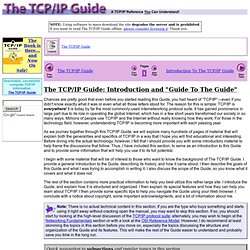
The reason for this is simple: TCP/IP is everywhere! It is today by far the most commonly-used internetworking protocol suite. It has gained prominence in large part due to its role in operating the global Internet, which has in a few short years transformed our society in so many ways. Millions of people use TCP/IP and the Internet without really knowing how they work. As we journey together through this TCP/IP Guide, we will explore many hundreds of pages of material that will explain both the generalities and specifics of TCP/IP in a way that I hope you will find educational and interesting. I begin with some material that will be of interest to those who want to know the background of The TCP/IP Guide. Windows - Platforms - PRISM Break. Darknet (file sharing) Darknets are distinct from other distributed peer-to-peer networks as sharing is anonymous (that is, IP addresses are not publicly shared), and therefore users can communicate with little fear of governmental or corporate interference.[2] For this reason, darknets are often associated with dissident political communications and illegal activities.
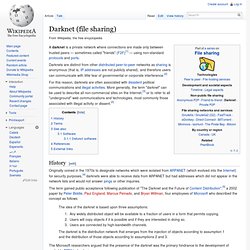
More generally, the term "darknet" can be used to describe all non-commercial sites on the Internet,[3] or to refer to all "underground" web communications and technologies, most commonly those associated with illegal activity or dissent.[2] The Microsoft researchers argued that the presence of the darknet was the primary hindrance to the development of workable DRM technologies. The term has since been widely adopted and has seen usage in major media sources, including Rolling Stone and Wired. Almost all known darknets are decentralized and therefore considered peer to peer.
Many darknets require a software to be installed to access them. Freenet. History[edit] The origin of Freenet can be traced to Ian Clarke's student project at the University of Edinburgh, which he completed as a graduation requirement in the Summer of 1999.[9][10][11] Ian Clarke's resulting unpublished report "A distributed decentralized information storage and retrieval system" (1999) provided foundation for the seminal paper written in collaboration with other researchers, "Freenet: A Distributed Anonymous Information Storage and Retrieval System" (2001).[12][13] According to CiteSeer, it became one of the most frequently cited computer science articles in 2002.[14]
